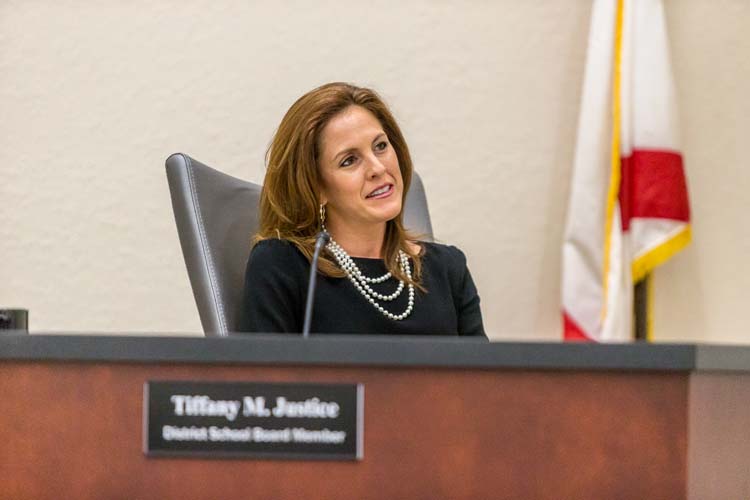
The Indian River County Chapter of the NAACP is asking the School Board to rein in one of its members, Tiffany Justice, who has taken over the African American Achievement Plan Core Committee in violation of board policy and the Open Meetings Act.
In a letter to board members, the NAACP cites School Board policy, which states, “To ensure that the presence of board members at committee meetings does not unduly influence or stifle committee deliberations, their attendance shall be in an observer status.”
If a School Board member does speak at a committee meeting, “Statements by board members which reflect personal opinion will be clearly identified as such to committee members,” according to district policy.
The NAACP said Justice has never “identified her comments or staff requests as personal opinion,” is interfering with the implementation of the African American Achievement Plan, “is functioning as a School Board member rather than as a private citizen” at the meetings, and “has given direction to District staff” at the meetings, all in violation of policy.
In addition, Justice’s opinions, preserved in minutes, could be construed as unlawful communication among board members, the NAACP said. “We believe that her comments, available to fellow board members, come uncomfortably close to being in violation of the Open Meetings Act.”
Only while sitting as a body may School Board members communicate with each other and take action, sunshine laws state.
Asked for a comment on the situation, Vice Chairman Charles Searcy said in an email he was “very disappointed a Board member and a high level District employee would team up to intimidate the African American Achievement committee. This District used to be controlled by unacceptable strong arm intimidation tactics and I certainly hope this is not the method of operation we are headed for.
“The legal department has been informed” of the NAACP letter, Searcy wrote, and he will ask that the organization’s requests be put on the next School Board meeting agenda.
Searcy did not specify what “high level District employee” he was referring to, but Assistant Superintendent of Curriculum and Instruction Pamela Dampier has been backing Justice’s actions and issuing instructions to the committee, which is composed of citizen volunteers and school district employees.
In addition to restraining Justice, the NAACP wants the School Board to rein in the role of staff on the committee. Currently any community member may join the committee, but school staff has been dictating the agenda and running the meeting, sometimes in adherence to Justice’s instructions.
The NAACP is asking that the African American Achievement Plan Core Committee be comprised of School Board appointees that come from the community. They want seven members, six to be appointed by the School Board and one appointed by the NAACP, which is the plaintiff in a federal lawsuit and party to a long-running federal desegregation order that gave rise to the African American Achievement Plan.
The group asks that three district staff members be assigned to support the committee’s work, one to take minutes, one to analyze data and one to disburse information and agendas.
The NAACP is also asking the School Board to bring back four experts hired to evaluate the effectiveness of the plan to present their findings. The district spent about $277,000 on the experts, but no reports or results have been given and the School Board hasn’t held Superintendent Mark Rendell to account for the expenditures.
Experts from the Southern University of Florida Positive Behavior Intervention and Support program were hired to study the root cause of the district’s disproportionate discipline of African American, at-risk and exceptional students, while District Management Group studied academic achievement gaps for African American, at-risk and exceptional students.
Equal Opportunity Schools was hired to identify African American and other minority students who could be enrolled in upper-level classes and suggest ways to remove barriers to access, and the Urban Learning and Leadership Center profiled 23 district schools, identifying pedagogical and school-culture causes for achievement gaps.
So far, none of the experts’ findings has been presented. Despite lacking expert input, Justice has pushed for a revised plan.
“Every Student Succeeds Act (ESSA) requires the school district make evidence-based decisions in adopting educational policies and programs and we intend to follow this practice in the African American Achievement Plan; therefore it is essential we hear from these experts,” the NAACP letter states.
The African American Achievement Plan is one of about 10 requirements laid out in the desegregation order the district has been laboring under for 50 years. The order was imposed by the U.S. District Court in 1967 and amended in 1994. The court named the local chapter of the NAACP the representative of the people and the plaintiff in the case in 1994.
The School Board filed a petition July 2017 that seeks to remove three requirements from court oversight, claiming equal treatment for African Americans has been achieved in faculty ratios, staff ratios and facilities access.
The NAACP does not agree.



